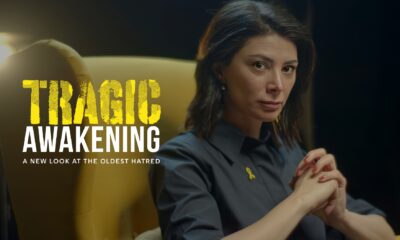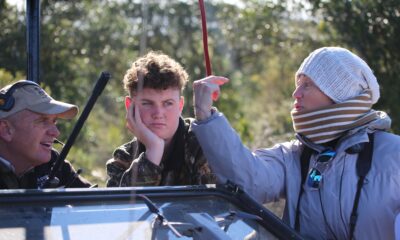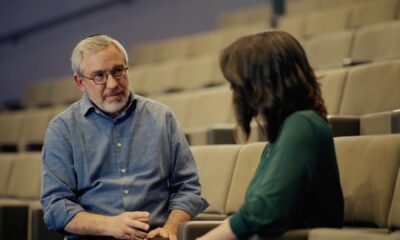
Featured Item

From Beaufort West to Berlin, Flatland reaches great heights
Film director Jenna Cato Bass and producer David Horler first met when they were growing up in Cape Town and were in the same year at school. Little did they know that they would one day join forces to create groundbreaking films that have made waves locally and internationally.
Their latest project, Flatland, premiered at the Berlinale (Berlin International Film Festival) in February 2019, opening its Panorama section to much acclaim, and hit South African cinemas on 30 October 2020.
Daily Maverick called it “fearless filmmaking from one of our own”. Bass told the SA Jewish Report “My grandmother grew up as a Jewish Afrikaans farm girl in Malmesbury. In many ways, this film is in homage to her.”
Set in Beaufort West in the Karoo, it tells the story of Natalie, whose disastrous wedding night leads to an accidental killing. She flees her husband and the rural town where the landscape is so flat that “you can see your future rolling in”.
After reuniting with her rebellious best friend, Poppie, the two young women escape together on horseback. Hot on their trail is police captain Beauty Cuba. The fates of these three different – yet equally desperate – South African women eventually converge.
A few days after its release on South African shores, Horler told the SA Jewish Report that, “The film has been travelling the world since February 2019 at festivals and screenings, so we’re really grateful and relieved it can finally come home and be seen by South African audiences.
“It’s been an interesting experience as this film started its life outside South Africa, and at the same time is very South African in terms of its cultural relevance and experience. While audiences abroad really appreciated and enjoyed the plot, the complexity of the characters, and messages explored in the film, there were undoubtedly many moments that only South African audiences would really appreciate.”
COVID-19 has meant that fewer South Africans are going to cinemas and, Horler says, “attendance is still a fraction of what it was this time last year, and we’re the first South African film to screen post-lockdown. So there are many unknowns.” But they remain positive that South Africans will welcome their work, and if the reactions of critics are anything to go by, it has definitely caused a stir.
Flatland has been described as modern, feminist version of the classic Western film, and Bass says she was definitely inspired by that field.
“The Western was one of my dad’s favourite genres, and we watched a lot of them together when I was getting into cinema. There was so much about them I loved – the action, the high stakes, the landscape, the horses – but at the same time there were never any characters I particularly related to. I started to realise how few – if any – Westerns placed women centrally in the narrative, and what this said about the genre. I realised that if I was going to make a Western, I would have to address this, and allow the characters to drive the genre, rather than the other way around.
“It also made sense to question the Western’s history as a colonial narrative – how this reflected in contemporary South Africa when we are still very much dealing with these issues of conquest and oppression,” she says.
The film is shot in Afrikaans and in a desolate rural town – not Bass’ first language or home environment. “There were most certainly challenges, but that’s when I as a director or writer like to acknowledge what I don’t know, and where I need help,” she says. “There was a huge contribution from our cast in realising the characters you see in the film. We also would never have been able to make the movie without the enthusiastic support and hospitality of Beaufort West and the surrounding communities.”
Horler says the majority of the film was shot in and around Beaufort West, with several days in Cape Town, which was a challenge for his production company, Proper Films. “As Beaufort West had no film infrastructure or support from vendors and suppliers – and we were at the height of the drought in the Western Cape – we had to be particularly meticulous with our planning and make sure we brought absolutely everything we needed with us from both a technical and personnel perspective.
“We also had an incredibly dedicated team of drivers travelling to and from Cape Town on an almost daily basis, bringing additional supplies or transporting actors and personnel that weren’t with us full time. Otherwise, the entire crew and cast lived in Beaufort West throughout the shoot.
“The hospitality of the town was unparalleled, from accommodation providers to the actors that we cast locally, even the mayor and local municipality. It’s an incredibly special place that in many ways simply cannot be matched on screen, which is why we decided to take both the financial and logistical risk of basing ourselves there instead of trying to recreate the environment in Cape Town.”
Going back to how they first met, Horler explains that “Jenna and I were both at Herzlia together and matriculated in 2004, but only connected properly at film school after I approached her to work together. We have worked together on and off ever since.” The duo’s major film from 2017, High Fantasy, was shot using cell phones, and has won multiple awards.
“The fact that we give each other the freedom and mutual respect to do our jobs makes it conducive for us to excel when working together,” says Horler. “We acknowledge each other’s unique skill sets and experiences, and give each other that freedom and trust to run with things. And when things do go wrong, there is always an openness to discuss issues and how best to fix them.”
Bass says that growing up in the Jewish community meant that “my life was very insular and secluded. When I left school, everything felt new, and I really appreciated how little I knew about the greater South Africa. I think this inspired me to learn and listen more to the world around me, because in a lot of ways, I was still a stranger to it.”
While South African cinema faces many challenges, especially in the “new normal” post-pandemic, both are excited about the future. “It’s always been and remains a challenge to realise an independent film, so we are both always working on multiple projects in the hope that a handful of them will pick up momentum and be able to be realised,” says Horler.
“Over the past few years, there is a very clear trend towards more authentic, engaging, and powerful local cinema. You can also see this playing out across the continent. Filmmakers are finding the confidence to tell their unique stories instead of trying to emulate Hollywood styles or focus on issue-driven identity films,” he adds.
“There is definitely a palpable excitement across the industry, with films today really standing out, having more successful lives outside of South Africa and resonating with people without needing to fit into narrow boxes,” says Horler. “At the same time, our production values and strength of storytelling continues to increase, making the films competitive in the international marketplace. So I do believe there is a renaissance of sorts taking place. A lot of the South African films that have come out in the past few years are a clear testament to this.”










